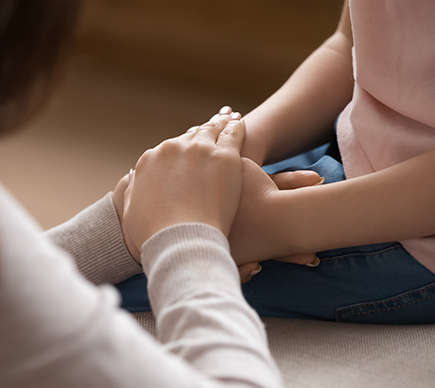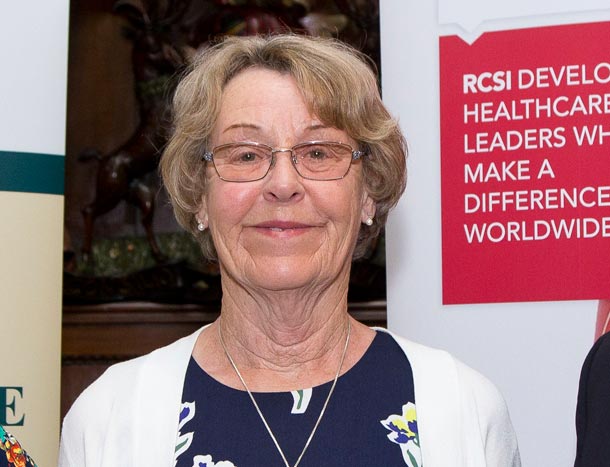Professional Certificate
7 months
Hybrid - Part-time
20 ECTS
4 September 2025
About
We know that loss and bereavement have significant personal, community, and health impacts; yet are under-studied, and not sufficiently incorporated into the curricula of health and social care professionals.
The Professional Certificate in Children and Loss, a collaborative programme between RCSI and the Irish Hospice Foundation, seeks to equip professionals who work with children/adolescents with the skills to understand and support them when grieving.
When a child experiences loss, either through death or parental separation, their needs are often misunderstood or overlooked. Because children may express their grief in ways that are different to adults, their reactions may go unrecognised.
As part of this programme you'll gain skills and knowledge to support you in developing a new and informed approach to how bereavement care is provided in the settings in which you work.
This is a part-time programme delivered in a hybrid model combining in-person and online learning.
This course is a Level 9 award on the Irish National Framework of Qualifications.

Understand models of grief in children and adolescents
Learn strategies for self-care when working with bereaved children
Examine the impact of family systems on a child's experience of loss
Explore specific issues related to younger children's grief
Develop skills in therapeutic techniques
Familiarise yourself with resources and services for supporting bereaved children
Suitable for
This programme is suitable for professionals whose work brings them into contact with children who are bereaved through a family death or parental separation. The course will be of interest to teachers, chaplains, social workers, social care workers, psychologists, counsellors, nurses and others who meet bereaved children in their work.
What you will learn
Explore child development, grief models, self-care, and family impact on loss
Learn practical approaches and resources for supporting bereaved children and adolescents
What our students say
Register your interest
If you would like further information about this programme, please contact iris.murray@hospicefoundation.ie.
Course information
The programme aims to equip you with the knowledge, skills, attitudes and values to:
- Demonstrate a critical understanding of core theories and ethical underpinnings of children and young people’s experiences of death loss and non-death loss in their lives and associated losses and changes.
- Determine the central principles essential to organisational and personal support while working with bereaved children and young people experiencing a death loss or non-death loss in their lives.
- Evaluate the impact of a range of losses and changes and how you may be experienced by children and young people at different developmental stages of their lives as a consequence of a death loss or non-death loss, whilst acknowledging the influence of diverse family and inter-generational histories and vulnerabilities, as well as the deprivation associated with systemic and social inequalities.
- Appropriately assess the resilience of bereaved children and young people as well as their familial and community supports taking account of structural and personal vulnerabilities and mitigating circumstances.
- Justify appropriate level 1 and level 2 interventions (ICBN, 2014) for children and young people according to their needs.
- Apply new knowledge and skills into professional practice.
- Reflect on professional development and personal growth through the educational experience.
- Exhibit an integrated, value-based, inclusive and evidence-based approach to the support of children and young people after a death or non-death loss in their lives.
The Professional Certificate in Children and Loss consists of two modules:
- Understanding Children and Loss
- Addressing Loss Issues with Children
Module 1: Understanding Children and Loss
On successful completion, you will be able to:
- Critically evaluate the core theories and ethical frameworks underpinning our understanding of children and young people’s experiences of death loss and non-death loss in their lives and associated losses and changes.
- Differentiate how a range of losses may be experienced by children and young people at various developmental stages, with reference to diverse family and inter-generational contexts, vulnerabilities, as well as deprivations associated with systemic and social inequalities.
- Appropriately assess the resilience of bereaved children and young people with reference to familial and community supports, personal and contextual vulnerabilities.
- Demonstrate reflective practice, self-care and self-awareness.
- Locate and critique current knowledge from loss-related literature.
Module 2: Addressing Loss Issues with Children
On successful completion, you will be able to:
- Critically determine the central competence and ethical principles essential to organisational and personal support while working with children and young people experiencing a death or non-death loss in their lives in relation to community interventions, formal support services and resources available.
- Evaluate appropriate intervention strategies for working with children and young people experiencing death or non-death loss with reference to appropriate Level 1 and Level 2 interventions (ICBN, 2014) for children and young people according to their needs.
- Demonstrate a discerning understanding of standards for safe and appropriate bereavement care for children and young people.
- Exhibit an integrated, value-based, inclusive and evidence-based approach to supporting children and young people after a death or non-death loss in their lives whilst acknowledging the influence of diverse family and inter-generational histories and vulnerabilities, as well as the deprivation associated with systemic and social inequalities.
- Develop critical self-awareness within the scope of professional role and limitations of competence.
- Reflect on professional development and personal growth through the educational experience.
This is a part-time blended course.
- Module 1 (September - December 2025): The Orientation session on 4 September will be in-person in Irish Hospice Foundation, Morrison Chambers, 4th Floor, 32 Nassau Street, Dublin 2, D02 X627. All other lectures in Module 1 will be taught online on Zoom.
- Module 2 (January - March 2026): All lectures will be taught in-person in Irish Hospice Foundation, Morrison Chambers, 4th Floor, 32 Nassau Street, Dublin 2, D02 X627, with the exception of 5 March 2026 Integrative session, which will be online on Zoom.
- All lectures, both in-person and online, will run from 9.15am - 4.15pm (with the exception of the two half-day online integrative group sessions on 5 December 2025 and 5 March 2026, which will be from 9.15am -1.15pm).
A course schedule is available on the Irish Hospice Foundation's website here.
This is an RCSI programme, run in association with the Irish Hospice Foundation. It is accredited by RCSI and National University of Ireland as a Level 9 qualification.
This course design supports the European Credit Transfer System (ECTS). RCSI and NUI have awarded the course 20 credits.
The programme is designed around Level 9 outcomes as identified in the National Framework of Qualifications.
Admissions
Applications are invited from professionals whose work brings them into contact with children who are bereaved through a family death or parental separation. The course will be of interest to teachers, chaplains, social workers, social care workers, psychologists, counsellors, nurses and others who meet bereaved children in their work.
- You must possess a Level 8 degree in a relevant area or international equivalent*. Alternatively, eligibility may be demonstrated through a defined recognition of prior learning (RPL) process. RPL requires demonstration of significant experience in working with children in a professional capacity or through formal volunteering, completion of CPD or other training in a relevant area, and relevance of the course to career/opportunity to apply learning.
- An academic transcript is also required. An academic transcript lists your complete academic history: programmes attended, a breakdown of marks/grades achieved, the degree awarded, your overall grade and conferring date.
- Applicants for whom English is not their native language may need to arrange a test to confirm proficiency in English with the International English Language Testing System (IELTS). More detailed information on requirements, exceptions and test centres is available here.
*International degree equivalency should be verified using the NARIC service from QQI.
Eligibility may be demonstrated through a defined recognition of prior learning (RPL) process. RPL requires demonstration of significant experience in working with children in a professional capacity or through formal volunteering, completion of CPD or other training in a relevant area and, relevance of course to career/opportunity to apply learning.
Applicants for whom English is not their native language may need to arrange a test to confirm proficiency in English with the International English Language Testing System (IELTS). More detailed information on requirements, exceptions and test centres is available here.
Total fee: €1,650
Please note
- The course fee may be paid by electronic funds transfer or credit/debit card to Irish Hospice Foundation.
- A non-refundable deposit of €250 is required on acceptance of a course place.
- Cancellations up to three weeks prior to the course commencing will be given a full refund, minus a cancellation fee of €200. Thereafter, no refunds will be made.
- Fees are eligible for tax relief.
How to apply
Applications are now open. The closing date for receipt of applications is 12 May 2025.
Apply now


